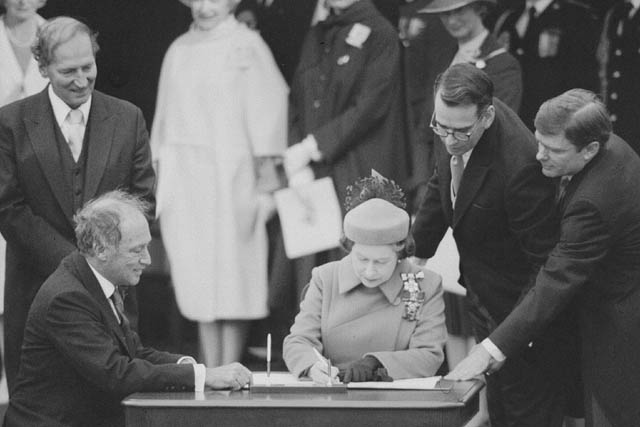 I mourn the passing of Pierre Elliot Trudeau when I read material like this: Canada's tolerance misplaced. The author constructs an impassioned argument for a return to Diefenbaker’s notion of unhyphenated-Canadianism. Canadian multiculturalism has led to a pluralistic society that most conservative right leaning individuals see as being problematic. Mr. Kanwar intones some of the typical perspectives:
I mourn the passing of Pierre Elliot Trudeau when I read material like this: Canada's tolerance misplaced. The author constructs an impassioned argument for a return to Diefenbaker’s notion of unhyphenated-Canadianism. Canadian multiculturalism has led to a pluralistic society that most conservative right leaning individuals see as being problematic. Mr. Kanwar intones some of the typical perspectives:
It is amazing that 77 per cent of the Canadian majority are scared of offending 23 per cent of minorities. We have become so timid that the majority cannot assert its own freedom of expression. We cannot publicly question certain foreign social customs, traditions and values that do not fit into the Canadian ethos of equality. Rather than encouraging new immigrants to adjust to Canada, we tolerate peculiar ways of doing things. We do not remind them that they are in Canada, not in their original homelands…
In a multicultural society, it is the responsibility of minorities to adjust to the majority. It does not mean that minorities have to to-tally amalgamate with the majority. They can practise some of their cultural traditions within their homes --their backstage behaviour. However, when outside of their homes, their front stage behaviour should resemble mainstream Canadian behaviour.
The Mount Royal professor is drawing on Goffman’s dramaturgical social theory of the self to construct his arguments about how his view of multiculturalism is to be expressed. His comments seem to suggest that there is an essential Canadian identity: one that is definitive enough to bring ‘cultural’ distinctions like female circumcision, or religious customs that contravene these essential characteristics. The question is whether such a unified identity is actually available or useful. Certainly some could point to a few general characteristics of being Canadian – but save the commodified stereotypes of the ubiquitous beer commercials – they often seem too broad or ambiguous. Mr. Kanwar himself fails to outline what the contours of his unhyphenated identity except that in some general sense it is different in public than in private. He manages to outline several things that being Canadian is NOT!
He also misses an important observation. Freedom of expression is precisely the elevating of minority and opposing points of view to equal status in the face of the reality that the dominant majority already has access and validity in the views they express. If freedom of expression is a value we would advocate in our society it must apply uniformly. Certainly freedom of expression exists within certain limits since we know that certain language is designed to damage peaceful and respectful relationship within a society. But any limits exercised must be done so uniformly.
Fredrick Barth suggests that ethnicity is produced and maintained not as some essentialized notion in isolation from other ethnicities. Instead he advocates that it is produced and maintained at the boundaries between ethnicities. Distinction is a productive choice of the interaction between ethnic types. If Barth is right then Mr. Kanwar’s position is a most interesting one. In his view being Canadian is not:
- a place where female circumcision is practiced
- a place where marriage is conducted on the dowry basis
- a place where female fetus are aborted based on their sex
- a place where national loyalty can follow religious conviction
The question is then – what kind of boundary do these statements actually contest or define? In any event it seems distinct and important enough for Mr Kanwar to suggest that…
Those who come here of their own volition and stay here must be truly patriotic Canadians or go back.
No comments:
Post a Comment